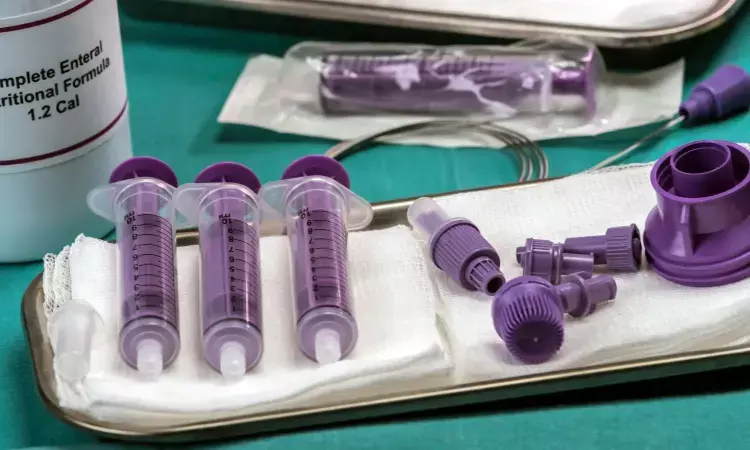- Home
- Medical news & Guidelines
- Anesthesiology
- Cardiology and CTVS
- Critical Care
- Dentistry
- Dermatology
- Diabetes and Endocrinology
- ENT
- Gastroenterology
- Medicine
- Nephrology
- Neurology
- Obstretics-Gynaecology
- Oncology
- Ophthalmology
- Orthopaedics
- Pediatrics-Neonatology
- Psychiatry
- Pulmonology
- Radiology
- Surgery
- Urology
- Laboratory Medicine
- Diet
- Nursing
- Paramedical
- Physiotherapy
- Health news
- Fact Check
- Bone Health Fact Check
- Brain Health Fact Check
- Cancer Related Fact Check
- Child Care Fact Check
- Dental and oral health fact check
- Diabetes and metabolic health fact check
- Diet and Nutrition Fact Check
- Eye and ENT Care Fact Check
- Fitness fact check
- Gut health fact check
- Heart health fact check
- Kidney health fact check
- Medical education fact check
- Men's health fact check
- Respiratory fact check
- Skin and hair care fact check
- Vaccine and Immunization fact check
- Women's health fact check
- AYUSH
- State News
- Andaman and Nicobar Islands
- Andhra Pradesh
- Arunachal Pradesh
- Assam
- Bihar
- Chandigarh
- Chattisgarh
- Dadra and Nagar Haveli
- Daman and Diu
- Delhi
- Goa
- Gujarat
- Haryana
- Himachal Pradesh
- Jammu & Kashmir
- Jharkhand
- Karnataka
- Kerala
- Ladakh
- Lakshadweep
- Madhya Pradesh
- Maharashtra
- Manipur
- Meghalaya
- Mizoram
- Nagaland
- Odisha
- Puducherry
- Punjab
- Rajasthan
- Sikkim
- Tamil Nadu
- Telangana
- Tripura
- Uttar Pradesh
- Uttrakhand
- West Bengal
- Medical Education
- Industry
Discontinuation of Enteral Nutrition for 4 hours more effective in maintaining nutrition compared to continuous method

A study published in Endocrinología, Diabetes and Nutrition, has supported the beneficial effects of 4 h of Enteral nutrition or EN discontinuation in relation to the group receiving EN continuously, providing greater nutrient administration, and when the biochemical endpoint considered was glycaemia. They observed a modest effect of EN discontinuation on plasma albumin levels, which can be related to the changes observed in glycaemia.
Explaining the study background, researchers said that EN assists in maintaining the nutritional status of hospitalised patients who cannot be fed orally. We determine whether continuous Enteral nutrition or discontinuous EN (infusion discontinued for four h during the night) has higher effectiveness in meeting nutrient recommendations and improving glycaemic control and biochemical parameters related to protein anabolism.
There were two groups: discontinuous (EN administered in mL/h, 18 h/day, 4-h night fasting) and continuous (EN administered in mL/h, 22 h/day). All patients with EN receive the diet over a 22-h daily period, in which the diet is suspended for two hours/day for daily hospital routines such as bathing and physiotherapy and followed for seven days.
The key results of the study are summarised below:
- In discontinuous and continuous groups, 52 patients followed up, 23 and 29 patients constituting 44.2 % and 55.8 %, respectively.
- The discontinuous group received volumes closer to those prescribed, equal or higher calories, and more protein than the continuous group.
- The capillary glucose values were within the reference range in the discontinuous group, but in the continuous group, values were elevated.
- Both groups had hypoalbuminaemia, haemoglobin, and haematocrit below the reference values, but in the discontinuous group, there was more improvement in serum albumin values than in the continuous group.
Based on our clinical findings, discontinuous enteral nutrition is more effective in meeting nutrient recommendations and is closer to the patient's needs.
The data about glucose levels indicated a beneficial effect of 4 h of EN discontinuation in relation to the continuous infusion group.
Further reading:
https://www.sciencedirect.com/science/article/abs/pii/S253001642200146X
BDS, MDS in Periodontics and Implantology
Dr. Aditi Yadav is a BDS, MDS in Periodontics and Implantology. She has a clinical experience of 5 years as a laser dental surgeon. She also has a Diploma in clinical research and pharmacovigilance and is a Certified data scientist. She is currently working as a content developer in e-health services. Dr. Yadav has a keen interest in Medical Journalism and is actively involved in Medical Research writing.
Dr Kamal Kant Kohli-MBBS, DTCD- a chest specialist with more than 30 years of practice and a flair for writing clinical articles, Dr Kamal Kant Kohli joined Medical Dialogues as a Chief Editor of Medical News. Besides writing articles, as an editor, he proofreads and verifies all the medical content published on Medical Dialogues including those coming from journals, studies,medical conferences,guidelines etc. Email: drkohli@medicaldialogues.in. Contact no. 011-43720751


